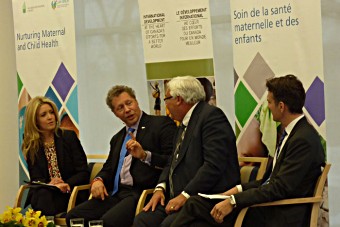
GAVI CEO Seth Berkley discusses the benefits of GAVI’s private sector partnerships with Sanofi Pasteur President Mark Lievonen. Looking on are Joel Spicer, President of Micronutrient Initiative, and Canadian public television host Catherine Clark, who moderated the panel on public-private partnerships.
Credit: GAVI/2014/Jonathan Stern.
Ottawa, Canada, 27 March 2014 – Public-private partnerships hold the key to progress in reducing child mortality, according to a high-level panel convened ahead of Canada’s global summit on maternal, newborn and child health.
The panel, which was co-hosted by the Aga Khan Foundation Canada and the Canadian Network for Maternal, Newborn and Child Health and included GAVI Alliance CEO Seth Berkley, emphasised the need for close collaboration between government, civil society and the private sector to achieve significant advances in global health and development.
“The big problems of the world aren’t going to be solved by government or the United Nations or the private sector or by civil society,” Berkley said. “They will be solved by finding new ways of those groups working together, taking advantage of the skill sets everyone has.”
Berkley was joined on the panel by Mark Lievonen, president of Canadian-based vaccine manufacturer Sanofi Pasteur; Joel Spicer, president of Micronutrient Initiative and Canadian public television host Catherine Clark, who moderated the discussion.
Examples
Berkley pointed to three examples of how successful public-private partnerships spearheaded by the GAVI Alliance have laid the foundations for reducing child mortality through immunisation:
- The Advance Market Commitment (AMC) has worked with pharmaceutical suppliers and government donors like Canada to reduce the price of the pneumococcal vaccine by 95%;
- The International Finance Facility for Immunisation (IFFIm) has worked with investment banks to raise US$ 4.5 billion by using government pledges to float Vaccine Bonds; and
- The GAVI Matching Fund has used financial commitments from the UK government and the Bill & Melinda Gates Foundation to attract corporate expertise, technology and funding to improve immunisation services for GAVI Alliance implementing countries.
Global summit on MNCH
The big problems of the world aren’t going to be solved by government or the United Nations or the private sector or by civil society. They will be solved by finding new ways of those groups working together, taking advantage of the skill sets everyone has.
Dr Seth Berkley, CEO of the GAVI Alliance
Canadian Prime Minister Stephen Harper has called for a global Summit on MNCH in Toronto at the end of May, immediately after the GAVI Alliance is due to announce its analysis of the demand for vaccines by implementing countries through to 2020.
The MNCH Summit and Canada’s partnership with the GAVI Alliance were both high on the agenda at meeting held earlier on Wednesday between Berkley, Canadian Minister of International Development Christian Paradis and his Parliamentary Secretary Lois Brown.
Brown provided an opening keynote speech to the panel.
“Canada aspires to do great things,” Brown said, noting that the Summit will “take stock and build consensus on a way forward” after the 2015 deadline for the UN Millennium Development Goals. In particular, the Summit will build on the Muskoka Initiative, spearheaded by Prime Minister Harper at the G8 meeting in 2010 to help save the lives of 1.3 million children and 64,000 mothers.
“Our goals are within reach, but to get there we need to be more focused and innovative,” Brown said. “We need to broaden our partnership with the private sector... Collective action is essential. We need to leverage additional capital, innovation and the technical know-how of private sector.”
Partnerships of magnitude
“We need partnerships of magnitude,” agreed Lievonen of Sanofi Pasteur. “Some of us are going to try to push it. I want to talk to stakeholders on how we become part of the solution.
Berkley noted that by encouraging public-private partnerships not only in vaccine supplies but also areas such as supply chain, vehicle maintenance and refrigeration, enormous efficiencies are achieved. However, he added that this requires building trust through dialogue.
“It doesn’t work to plug off-the-shelf solutions into a government health centre or rural clinic. Customisation and consensus are necessary,” said Berkley. “As we move into the next phase of GAVI, we are going to double down. But how do we finish the job? We need the expertise of private sector. It requires money, willpower, partnership, new ways of working and being accountable. We’ve shown we can do it, and it’s something worthy of doing.”
